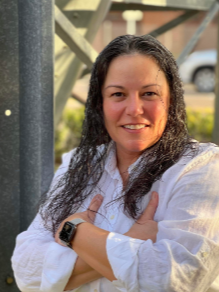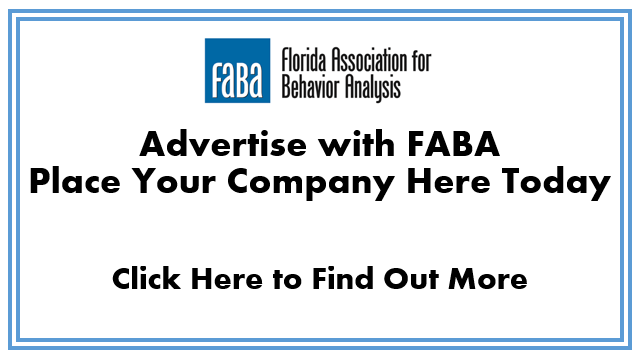|
|
For general questions or to reach any of the individuals below, contact us at: [email protected]
FABA Board of Directors
 Melissa "Missy" Olive, PhD Melissa "Missy" Olive, PhD
Executive Director Missy is the Executive Director of the Florida Association of Behavior Analysis (FABA) and she currently serves as the Vice President of the Progressive Behavior Analyst Autism Council (PBAAC). Missy previously served as Co-Director of Public Policy for FABA and she served on the CTABA Board of Directors from 2016-2021. She chaired the CTABA Public Policy and Legislative Outreach Committee (PPLO formerly called Legislative Committee) from 2016-2022. She previously served as a Member at Large on the Executive Council for CTABA from 2011-2013. Missy also served on the Executive Board as a Member at Large for the Division of Early Childhood (DEC), a sub-division of the Council for Exceptional Children (CEC) and as President of the Texas Council for Exceptional Children (TX-CEC). Missy is also the Chief Clinical Officer at Adapt for Life ABA. Missy previously served as the Chief Clinical Officer of Cultivate Behavioral Health and Education following the acquisition of her company, Applied Behavioral Strategies (ABS). Missy founded and directed ABS from 2010 until its acquisition in 2020. Missy also worked at The Center for Autism and Related Disorders (CARD) in their Austin, TX and Larchmont, NY offices. Prior to working in the ABA space, Missy spent 9 years conducting research and training special education teachers and behavior analysts at the University of Texas at Austin and the University of Nevada, Reno. Missy currently serves as a Guest Reviewer for the Journal of Autism and Developmental Disorders and the Review Journal on Autism and Developmental Disorders. She also served on the Editorial Board of the Journal of Early Intervention for 8 years, Topics in Early Childhood Special Education for 10 years, and Young Exceptional Children for 12 years. Missy has published over 30 peer-reviewed articles and book chapters focusing on assessment and treatment of challenging behaviors, communication intervention, feeding disorders, and ethical issues for behavior analysts. She is also the recipient of over $1.6 million in federal and state funding for research and training in the field. Her current interests lie in the areas of assessment and treatment of feeding disorders, assessment and treatment of severe challenging behavior, ethical issues in the delivery of ABA services, clinical compliance of ABA services, and ABA services in school settings. Missy is the guardian of her youngest brother, Mac, who has lived with Missy or in residential services near her since he was 13 years old. She is married to Norm and is also the bonus mom of two amazing women, Summer and Gigi. When not working, you can find Missy and Norm on a boat, out on their bikes, or traveling.
 Matt Potak Matt Potak
President Matt Potak, BCBA has over 20 years of experience working with children and adults with Intellectual Disabilities. He received his undergraduate degree from the University of South Florida in psychology with a Bachelor of Arts degree in 1999. Matt received his master’s degree from Florida Institute of Technology in 2007 with a Master of Science in Applied Behavior Analysis. He has a diverse background which includes working with individuals with acquired and traumatic brain injury, intellectual disabilities, developmental disorders, and autism. Matt began his career as a direct care staff. He has held the positions of behavior assistant, Board Certified Assistant Behavior Analyst, Board Certified Behavior Analyst, and Co-Instructor for the Florida Institute of Technology Program for ABA. Matt started Behavior Analysis Solutions where he provides services for adults with intellectual disabilities and recently opened a clinic for children in central Pinellas County. Matt has extensive experience and knowledge of state standards and regulations, and ensuring subsequent compliance. Matt continues to advocate for Behavior Analysis providers across Florida by attending and voicing concerns at AHCA workshops and hearings. Matt is a previous Local Review Committee member and has served as the president of the Bay Area Association for Behavior Analysis for the past 17 years. He served as a FABA Board Member from 2016-2019. He has served as the Co-Chair for the local FABA Chapters and continues to serve with other local chapter representatives to plan and coordinate the annual CoFABA conference. Matt has served on other FABA Committees including the Program Committee, Developmental Disabilities-Special Interest Group, and Public Policy Committee, where he currently serves as Co-chair. Matt has worked with FABA and other ABA providers to educate our Florida Legislators about ABA and intellectual disabilities while attending events in Tallahassee such as Developmental Disabilities Day. As President of FABA, Matt looks forward to helping our profession across Florida, be the advocate and the voice for providers/members, families, and clients. Matt is aware of the concerns and struggles we all have as providers and as professionals. Matt will work tirelessly to promote communication and education so we can come together and find solutions together.
 Kerri Peters, PhD Kerri Peters, PhD
President-Elect Dr. Kerri P. Peters earned her master's degree in Behavior Analysis from the University of North Texas in 2007 and her Ph.D. in Psychology from the University of Florida in 2013. She is a Clinical Assistant Professor in the Department of Psychiatry, Division of Psychology. Dr. Peters is the Administrative Director of the UF Health Center for Autism and Neurodevelopment (UF Health CAN) and collaborates with the UF BARC as the Clinical and Research Director. Through a contractual relationship with the Florida Autism Center (FAC), a division of BlueSprig Pediatrics, Dr. Peters is the Center Director of the FAC Specialty Clinics located at and in collaboration with UF Health CAN. Dr. Peters’ primary area of clinical research is applied behavior analysis, with emphases in the areas of intellectual disabilities and autism, challenging behavior, multidisciplinary care, and parenting. Dr. Peters was the recipient of the Henry C. and Audrey S. Schumacher Fellowship demonstrating outstanding scientific promise. She currently serves on the Executive Board of the Florida Association for Behavioral Analysis and is President-elect for the 2025-2026 year. She also serves on the steering committee, clinical, and research task forces for the UF Health CAN.
 Kim Lucker-Greene, PhD Kim Lucker-Greene, PhD
Immediate Past President Dr. Kim Lucker-Greene is a Board Certified Behavior Analyst (BCBA-D) with more than 30 years of experience designing behavioral & learning programs for a variety of populations, including persons with emotional/behavioral disorders, autism, and other developmental disabilities. She received her graduate training in Applied Behavior Analysis at Florida State University, where she was awarded her Ph.D. in 2000. Dr. Lucker-Greene conducts training and workshops in the areas of language and social skills development, autism and sexuality, and behavioral assessment & intervention. She has been consulting with families, school districts, and state & private agencies since 1993 and founded Behavioral Solutions Consulting, Inc. in 2012. Dr. Lucker-Greene is involved in professional advocacy and state legislative efforts on behalf of Behavior Analysts and their stakeholders. Dr. Lucker-Greene is extremely passionate about improving the lives of others through the science of Applied Behavior Analysis and the development of ethically-minded professionals in the field of ABA.
 Marta "Tiki" Fiol Marta "Tiki" Fiol
Secretary
I have worked in the ABA field for 20+ years. Academically, I was privileged to study under two fantastic leaders, Dr. Jose Martinez-Diaz and Dr. Eb Blakely. I earned my undergraduate degree in Psychology from the University of Central Florida (UCF) (2000) and my master's in science from Florida Institute of Technology (2004). Following this, I enrolled in the Public Affairs Ph.D. Program at UCF, where I studied policy analysis, tools of governance/governments, strategic planning, management, legislative analyses, and more. Even as an ABD, the knowledge I gained has been invaluable in assisting others. For example, I lead our state in its successful legislative initiatives for RBTs/ABA, which has evolved into multi-state collaboration efforts. Professionally, I own an ABA company that provides home and community-based services throughout Central Florida. The best part of my job is working alongside an amazing team of humans dedicated to making a positive difference. My time is also allocated to serving on multiple ABA boards. Currently, I am the Past President of FABA and an integral member of various committees (e.g., Legislative, DEIA, Executive, etc.). I live in Merritt Island with my wife Dana and our boys, Jackson and Brantley. In my free time, I support our boys by volunteering as their little league baseball coach, supporting our local school's PTOs, advocating at school board meetings, or attending rallies to oppose the MAJOR legislative and academic changes that negatively impact our teachers and students. More info is located on social media.
 C. Baker Wright, PhD C. Baker Wright, PhD
Treasurer Baker Wright, PhD, BCBA-D is the team leader and owner of Behavior Management Consultants (BMC), an Applied Behavior Analysis group based in Tallahassee, Florida and with teams across Florida and South Georgia. Baker received his MA from East Carolina University and his PhD from Florida State University in 2005. Baker has been with BMC since 2000, working directly with individuals with a wide array of learning and behavior challenges. Most of his work has been as a consulting behavior analyst for school districts across the Southeast since for over 20 years, working in classrooms and training teachers, administrators, and paraprofessionals. More recently, he has been in leadership of the BMC teams spanning from Ft. Lauderdale Florida to Valdosta, Georgia. He researched and co-authored a book and procedural manual for teachers and schools, AutomaticRtI-Behavior Edition, that provides a comprehensive solution for the many challenges of the RtI process for behavior. He has served on the Board of Directors for the Florida Association for Behavior Analysis, currently serves as the Treasurer, and has been an invited presenter at state and national conferences as well as school districts, universities, and private providers across the country.
 Yanerys Leon, PhD Yanerys Leon, PhD
Member-at-Large
 Michelle Castaños, EdD Michelle Castaños, EdD
Member-at-Large
 Kelly Therrien Kelly Therrien
Member-at-Large
As the Director of Talent Management for ALULA, Kelly Therrien is dedicated to improving workplaces through Organizational Behavior Management. Kelly develops and executes the corporate talent management strategy aligned to the company strategy. Ensuring the organization’s talent is enabled to execute against our strategy and supported to achieve professional goals and career growth, while simultaneously ensuring client outcomes. Before returning to ALULA in her current role in Talent Management, Kelly applied her talents as Product Manager for Professional Development with ABA Technologies, Inc., overseeing various professional development products to aid in dissemination of human behavioral science. Most notably, Kelly worked with the team in designing and developing the all new OBM Specialist program to improve student learning outcomes and profitability of the program. Kelly developed her subject matter expertise by working up the ranks from delivery consultant to Senior Consultant, to Project Manager with ALULA during the course of her career after earning her graduate degree. Kelly was also a member of the Operations Team, playing a vital role in the Consultant Readiness and Delivery function. Kelly earned her MS in Applied Behavior Analysis with an emphasis in Organizational Behavior Management from the Florida Institute of Technology. She earned her BCBA certification and has maintained it in good standing since 2004. Kelly also holds a BS in Psychology with a minor in Business from Florida State University, having completed the Performance Management track. She has published articles in both the Journal of Applied Behavior Analysis and Journal of Organizational Behavior Management. Kelly is active in her behavioral science community through networking, disseminating, and contributing to the field, and is President-Elect of the Organizational Behavior Management Network (2023) and Member at Large for the Florida Association of Behavior Analysis Board of Directors (2022). She previously volunteered her time as President for the Association for Behavior Analysis of Brevard (county FABA Chapter 2021-2013), served as their Vice President (2019–2021) and Treasurer (2017–2019). Kelly is also a volunteer mentor with weVENTURE’s Ignite 360 program, a small business administration organization that serves the local community and puts entrepreneurs in contact with local professional services to help achieve accelerated business success.
 Lindsay Lloveras, PhD Lindsay Lloveras, PhD
Member-at-Large Dr. Lindsay Lloveras obtained her master's degree in Applied Behavior Analysis from Western New England University in 2018 and her Ph.D. in Behavior Analysis from the University of Florida in 2022. Dr. Lloveras is a Behavior Analyst for the UF Health Center for Autism and Neurodevelopment (UF Health CAN) and coordinates the inpatient behavioral consultation program at UF Shands Children’s Hospital. Her primary area of research is in the assessment and treatment of behavior disorders, with an emphasis on quantitative analysis.
 Jonathan Fernand, PhD Jonathan Fernand, PhD
Member-at-Large Dr. Jonathan K. Fernand received his master’s degree from the California State University, Sacramento in 2012 and his Ph.D. from the University of Florida in 2017. Jonathan is an Assistant Professor in the School of Behavior Analysis at the Florida Institute of Technology. He has served as a reviewer for several journals including the Journal of Applied Behavior Analysis, Behavior Analysis in Practice, Behavior & Philosophy, and The Analysis of Verbal Behavior. Jonathan has presented at regional, national, and international conferences and has authored several articles and book chapters pertaining to a range of topics including the assessment and treatment of pediatric feeding problems, treatment of restricted and repetitive behavior, caregiver and staff coaching, applied animal learning and welfare, as well as issues pertaining to competency, ethics, and equity of marginalized populations. Jonathan enjoys giving back to the behavior analytic community including his roles as a Member-at-Large for the Florida Association for Behavior Analysis (FABA) and a Subject Matter Expert for the Behavior Analyst Certification Board (BACB). He also serves on several clinical advisory boards and consults within clinical and educational service facilities.
 Vivian Ibañez, PhD Vivian Ibañez, PhD
Member-at-Large
 Colleen Taylor Colleen Taylor
Early Career Member-at-Large
Colleen F. Taylor became a BCBA in May of 2020. She has been working in the field of ABA since 2011, mostly with children and young adults with Autism Spectrum Disorder. She has a passion for teaching social skills, collaborating across disciplines and professions, and empowering parents and caregivers to utilize Behavior Analysis with their loved ones. In her free time, Colleen enjoys spending time with her two daughters and husband in Tallahasee, attempting to garden and exploring state parks. Colleen began her position as a Early Career Member at Large in January 2024 and is looking forward to using her role in helping our organization.
 Nicki Postma-Gates Nicki Postma-Gates
Public Policy Co-chair Nicki Postma-Gates has been working in the field of behavior analysis for nearly 20 years. Her education includes a master's degree in OBM from FIT and a bachelor's from Western Michigan University. Following graduation, she gained experience from the now-dissolved BASP program providing ABA support to children in foster care. She also had the opportunity to work with UCF CARD where she gained invaluable experience working with families navigating school issues. Additionally, she has worked with adults with disabilities and serves as a local committee member for LRC. She currently serves as the Director of Business Development for a national ABA company with a primary focus of ABA in the school setting. Nicki has had the privilege of working with FABA previously as a member-at-large and currently as the co-chair for the public policy committee. She helps lead the educational workgroup to bridge the gap between ABA providers and Florida Schools.

Kevin Murdock, PhD
Public Policy Director I began my career as a behavior analyst in 1975. I had the great privilege of learning from amazing mentors including Darrel Bostow, Jon Bailey, and Maxin Reiss. I presented a poster at the inaugural conference of FABA and have been thrilled to see our growth and positive impact on ABA service providers and the protection of consumers. I've worked as a service provider and a manager across various settings. Approximately the last half of my career, I consulted for a large Florida school district until my (semi)retirement in 2020. I enjoy spreading the good news about the field of ABA and providing consultative services on a limited basis. I enjoy spending time with my wife, three daughters, and Stewie, our rescue bull terrier.
FABA Committees
Legislative and Public Policy Committee
- Eric Prutsman - Lobbyist & Legal Counsel
- Kevin Murdock, PhD - Director
- Nicole Postma - Co-chair
- Mary Riordan, PhD - Co-chair
- Matt Potak
- Melissa Olive, PhD
- Michelle Castaños
- Colleen Taylor
- Use this link to Email the Committee
DEIA Committee
- Lindsay Lloveras, PhD - Chair
- Jonathan Fernand, PhD
Conference Program Committee
- Emily "Nikki" Dickens, EdD - Chair
- Kerri Peters, PhD
- Kelly Therrion, PhD
- Melissa "Missy" Olive, PhD
- Kolton Sellers
FABA Local Chapters (CoFABA)
- Kim Lucker-Greene, PhD - Chair
- Matt Potak
Awards Committee
- Iser "Willie" DeLeon, PhD - Co-chair
- Emily "Nikki" Dickens, EdD - Co-chair
Membership Committee
- Yanerys Leon, PhD - Chair
- Michelle Castanos
- Kim Lucker-Greene, PhD
- Melissa "Missy" Olive, PhD
- Kolton Sellers
Social Media Committee
FABA Observer
- Michelle Castanos - Editor
- Lindsay Lloveras, PhD
Mailing Address:
3116 Capital Circle NE, Suite 2
Tallahassee, FL 32308
Please note: Any mail sent certified, receipt request, or requiring signature will likely be returned to the sender since we do not always have someone in the office to receive such special mail.
President-Elect
This position requires a three-year commitment to FABA.
As President-Elect the individual serves on the Executive Board and chairs Board meetings in the absence of the President. The President-Elect is expected to “shadow” the President and learn those duties as well as serve on several of the FABA Committees that are central to the operation of the organization. One of those is the Program Committee where the President-Elect assists in the review of submissions and makes recommendations to the Program Chair.
During the Presidential year, this person presides over the Board meetings and is expected to play an active role in the development of the Annual Conference and with issues of importance to the Association that may arise during that year. This includes communicating with state agencies and other associations regarding our positions on various issues and speaking on behalf of FABA in front of legislative committees when the Florida Legislature is in session.
The immediate Past President serves on the Executive Board, is responsible for that year’s election process, and hosts the Past Presidents’ Breakfast on the Friday morning of the Conference. As an experienced member of the Board, the Past President is expected to continue to show leadership in decision-making and to actively participate on critical committees.
Member-at-Large
At-large members are elected to three-year terms to the Executive Board and are expected to be active participants on behalf of the Association during this time. Those elected may serve in several capacities depending on availability and preference. A few of the roles that may be chosen or assigned include Observer Newsletter Contributor, Awards Committee Chair, Local Chapters Committee Chair, Conference Poster Session Committee Chair, and Conference Local Arrangements Committee Chair.
Advertising Disclaimer
Paid advertisements appear in Florida Association for Behavior Analysis publications, including print and other digital formats such as the fabaworld.org website. FABA does not endorse or evaluate the advertised companies, services, practices, or products, nor any claims made by the advertisement. FABA reserves the right to refuse, reject, or cancel any ad for any reason at any time without liability.
|
|
THANK YOU PANELISTS AT "CHALLENGES FACING US TODAY" - SEPT. 29, 2023
LISTED ALPHABETICALLY:
IMPORTANT:
AHCA MANAGED CARE PLAN RESPONSE DEADLINES EXTENDED
Please note that on August 11, AHCA posted revised dates for responses to the plan:
October 25, 2023 - Deadline for Respondents to Submit
October 27, 2023 - Date AHCA will post Respondent Names
November 9, 2023 by 500PM - Deadline for Provider Comments
See the ITN pages 757, 758, and 788 regarding Behavior Analysis Services and the transition to the Managed Care Plan.
For revised response dates, scroll down to Downloadable files: Addendum 4
Please stay tuned for more information.
RBT HB 795 PASSED! Effective July 1, 2023, schools are now open to more RBTs providing services as Private Instructional Personnel (by removing the requirement of employment by a Medicaid Provider.) This was made possible due to the support of Rep. Tant and Sen. Hooper; and the advocacy efforts of parents and providers who contacted state leaders and the Governor via our VoterVoice online campaign. Thanks to all who helped this law become effective! FABA plans more work with the Dept of Education to improve RBT access.
AHCA Medicaid and eQHealth/Kepro: FABA continues closely monitoring developments regarding AHCA's implementation of current rules and future policy changes involving behavior analysis services, fee schedules, CPT billing codes, and related issues. These issues significantly impact the availability of ABA services for recipients and their families, plus service providers across Florida. FABA will continue pressing for improvements.
STAY UP TO DATE:
Follow FABA's Facebook to stay informed about all FABA Public Policy Alerts and News.
Set a weekly reminder to check our Action Center for any new advocacy campaigns
STAY IN TOUCH:
Please email your questions, comments, or concerns to the Public Policy Committee at [email protected]
FABA Public Policy Committee:
Eric Prutsman – Lobbyist & Legal Counsel
Kevin Murdock, PhD – Director
Matt Potak – Co-Chair
Mary Riordan, PhD – Co-Chair
Nicki Postma Gates - Co-Chair
Michelle Castaños, EdD
Colleen Taylor
Save |
FABA Code of Ethics
The Executive Committee of the Florida Association for Behavior Analysis has adopted the BACB Ethics Code for Behavior Analysts as our FABA Code of Ethics as well as the RBT Ethics Code (2.0).
Click here to find a current copies of codes by the Behavior Analyst Certification Board.
|
|
FLORIDA ASSOCIATION FOR BEHAVIOR ANALYSIS
Revised September 1987, September 1990, September 1993, October 2009, July 2017, September 2022, September 2023
The name of this organization shall be The Florida Association for Behavior Analysis. It shall be chartered and exist as a non-profit corporation in and under the laws of the State of Florida.
Article II—Purpose of the Association
The Florida Association of Behavior Analysis (FABA) was founded in 1980 to promote the use of effective and humane behavior analytic procedures in education, business, industry, government, and clinical settings, including both private and public sectors throughout the State of Florida. Association goals include upholding ethical practices, providing high quality continuing education, and promoting research, service, and legislation that supports behavior analysis and practitioners of behavior analysis services.
Article III—Purpose of the Bylaws
These bylaws are created to assist in the effective and efficient governance of FABA. These bylaws are subject to the higher authority of relevant statutes adopted by the Florida state legislature. All members of the FABA Board of Directors (hereafter referred to as Board), FABA Board, or Board) and association members are to operate in conjunction and in compliance with these bylaws.
Article IV—FABA Membership
Membership: Membership is open to all persons interested in or actively engaged in teaching, research, and/or the application of the principles and procedures of behavior analysis. Membership is not restricted to residents of the State of Florida. However, eligibility to run for an elected position on the FABA Board is restricted to Florida residents.
The Association does not and will not discriminate against the granting of memberships to persons based on race, gender, sexual orientation, socio-economic status, national origin, or creed
1. Categories of Membership: Membership shall be in one of four categories:
-
Professional Behavior Analysts: This category includes individuals certified as a Florida CBA, BCaBA, BCBA, or BCBA-D. Members in this category are voting members and may run for positions on the FABA BoD.
-
Professional, Other: This category includes any degree-holding person employed full- or part-time, including professionals with licenses and/or credentials other than those provided by the BACB. This includes, but is not limited to Speech Therapists, Occupational Therapists, Licensed Mental Health Counselors, Social Workers and other similar professions. Members in this category are nonvoting and may not run for elected positions.
-
Paraprofessional: This category includes Registered Behavior Technicians (RBTs), direct care staff, paraprofessional staff who spend the majority of their working time implementing behavior programs and/or strategies. Members in this category are nonvoting and may not run for elected positions.
FABA’s fiscal year begins January 1 and ends on December 31. The FABA Board shall establish a minimum annual membership fee for active members and may establish differential fees dependent upon the level of membership (i.e., professional, student, etc.). Paying dues will provide active membership from the date of payment until the end of the membership year (December 31).
FABA’s membership year begins January 1 and ends December 31. To remain an active member in good standing, an individual must pay annual association dues. Dues paid between January 1 and December 31 will apply to that calendar year of membership. To receive any membership discounted rates for FABA events, an individual must have paid their dues prior to the respective event. Dues paid after January 1 during the membership year will allow a member to be placed in good standing until December 31.
Each active Professional and Sustaining member shall be entitled to one vote on all matters brought before the Association. There shall be no proxy voting. At the discretion of the Board, voting may occur electronically through a secure online portal/forum, postal mail, or during the Business Meeting of the annual conference. It is the responsibility of those with voting privileges to maintain updated email contact information with the Association and to remain vigilant of voting notices. All voting privileges must be exercised within the designated period stated in the voting notification. A two-thirds majority of voting members present at time of voting is needed to change bylaws, and a simple majority for elections and other issues.
5. Termination of Membership:
The FABA Board may, by two-thirds vote, suspend or expel any member of this association for violation of these by-laws or gross ethical violations. Before the Board takes such action, written notice shall be sent to the member no less than 30 days prior to the meeting of the FABA Board at which time the matter is to be considered. Said member shall be entitled to a hearing before the FABA Board of Directors.
6. Application for Membership:
Persons desiring to apply for membership in the Florida Association for Behavior Analysis shall submit a completed application form and dues according to the procedures outlined at FABAworld.org.
Article V—FABA Board of Directors
FABA Board of Directors: The BoD consists of officers of the association who shall oversee and assist with business operations of the association. The FABA Board shall include the President, the President-Elect, the Past-President, the Treasurer, the Secretary, five to seven members-at-large, and an Executive Director.
Executive Committee: A select group of board members will comprise the executive committee of FABA. These include the President, President-Elect, the Past-President, the Treasurer, and the Executive Director. The executive committee can conduct business in lieu of a BoD meeting related to specific ad-hoc issues that may arise, including but not limited to financial decisions, contracts, and public relations. Executive committee meetings must take place in real time via teleconferencing, videoconferencing, or face-to-face meetings, and can be called upon with at least 48-hour notice (or less if the urgency of the issue warrants less notice). The executive committee will report back to the BoD on issues discussed or decisions made within 48 hours of meeting.
All elected positions on the FABA Board will begin and end during FABA’s annual business meeting at the annual conference. The terms of office for the elected BoD positions are described below.
-
Members-at-Large: These FABA Board members shall serve three-year terms and cannot serve successive terms; however, they can be elected into different BoD positions at any point during their term or after their term. The number of positions available for the members-at-large will be determined by the FABA BoD and may be increased or decreased with Board approval to accommodate membership fluctuations or other needs of the association.
All board members will be required to attend FABA Board meetings, maintain communications with the FABA Board throughout the year, serve on FABA committees, and assist with the operations of the Association. Additional duties of the Officers shall be as specified in the bylaws listed herein.
In the event of death, incapacity, resignation, or election of any of these officers to different office positions (e.g., member-at-large to president), the FABA Board shall, by majority vote, elect a successor to serve in the committee member’s empty position until the next election cycle is completed. This successor may be an organizational member or an existing board member who is scheduled to rotate off the board who may be appointed and have their term extended.
-
Conflict of Interest/Confidentiality:
FABA board members must not engage in conflicts of interest that could potentially damage the association or affect decision-making of issues regarding the association. Board members must report any potential conflicts of interest each year and engaging in a conflict of interest may result in termination of board duties. Additionally, all board members must adhere to strict confidentiality regarding board meetings and association business, unless otherwise described by the Board.
With approval of the Board, board members may borrow money and incur indebtedness for the purposes of this association and to cause to be executed and delivered therefore, in the association name, promissory notes, bonds, debentures, deeds of trust, mortgages, pledges, hypothecations, or other evidences of debt and securities, therefore.
The Board, except as the Bylaws otherwise provide, may authorize any director or directors, agent or agents, to enter into any contract or execute any instrument in the name of and on behalf of this corporation. Such authority may be general or confined to specific instances. Unless so authorized by these Bylaws or the Board, and except as in this Section hereinabove provided, no director, agent or employee shall have any power or authority to bind this corporation by any contract or agreement, or to pledge its credit, or to render it liable for any purpose or to any amount.
All board members, former board members, and board members-elect, or any person who may have served at the request of the Association, shall be indemnified against legal liability and from expenses actually and necessarily incurred in connection with the defense of any action, suit, or proceeding in which such person is made a party by reason of being, or having been, such board member or person, except in relation to matters as to which such person shall be adjudged in such action, suit, or proceeding, to be liable for intentional misconduct in the performance of duty. Furthermore, all board members, former board members, and board members-elect, or any person who may serve or have served at the request of the Association shall be indemnified from legal liability from any of the actions of any member of the Association purporting to act for the Association, acting without its official approval or recognition, or who improperly uses the property of the Association.
Article VI—Nominations and Elections of FABA Board Members
-
If the Elections Committee Chair (past-President, by rule in Article IX-c) is nominated and decides to run for an office, s/he must immediately contact the FABA Board to reassign the Elections Chair responsibility to another member of the Elections Committee.
Elected members of the FABA Board shall assume office at the Business Meeting at the annual FABA conference meeting and shall hold office until their successors are elected and assume office in their stead.
Any officer or member of the FABA Board may be recalled in accordance with following procedure:
-
Upon validation of the petition, the President or his/her designate shall cause a mail ballot to be prepared and distributed to the membership having voting qualifications (this can be done electronically). The ballots shall be received and tabulated by the Past-President who shall certify each to be valid.
-
Local Chapters Officer Elections:
All local chapters of FABA must develop their own elections and nominations processes for officers of their chapters and follow their own procedures for terms and recall of officers.
Article VII—Business of the FABA Board of Directors
All business of the BoD will comply with State and Federal laws, as well as any state chapter standards set forth by the Association for Behavior Analysis International. All board members will also adhere to all current ethical standards developed by the Behavior Analyst Certification Board.
The FABA Board shall hold at least two meetings per year. One meeting will occur at the time and location of the annual conference (i.e., September) and the other meeting will occur in January. The board shall also meet at other times and locations deemed necessary by the President or Executive Director. A meeting of the FABA Board may also be called upon by at least three members of the Board who must notify the remaining members at least two weeks in advance of the proposed meeting. FABA Board meetings shall be conducted informally but in the spirit of Robert’s Rules of Order. Meetings shall consist of all board members and any invited affiliates or committee chairpersons. Any invited affiliates or committee chairs will be nonvoting participants of the FABA Board meeting unless they are simultaneously serving as an elected member. Nothing herein shall be construed to preclude a Committee Chairperson from simultaneously holding membership on the FABA Board, either as an Officer of the Association or as a member-at-large.
Voting may take place in FABA Board Meetings during which a quorum of committee members is present. For purposes of transacting business of the Association, a quorum shall consist of half of the FABA BoD plus one. A simple majority vote of the voting members present will be sufficient to pass any motion; however, two-thirds majority of the voting members present at the annual association business meeting is required for approval of an amendment to these Bylaws.
Members of the FABA Board who fail to maintain membership in good standing in the Association are subject to removal by majority vote of the remaining members of the Board. A tie vote shall be construed as affirmation for removal. Positions vacated for any reason shall be replaced by majority vote of the remaining members, such successors to serve until the next elected person takes office.
Article VIII—Association Annual Business Meeting
There shall be at least one annual business meeting of the entire Association. This meeting shall be held in conjunction with the Annual Convention of the Association except in the event of no Annual Convention in which case, the meeting shall be held in conjunction with a regularly scheduled meeting of such other group or Association as shall be designated by the FABA Board. Notice of the annual meeting of the Association shall be given to members in good standing not less than two months prior to the scheduled date.
A quorum at the annual business meeting shall consist of not less than twenty members-in-good-standing present and voting.
Voting may take place at the association business meeting on matters that arise during the business meeting or matters that were provided to members in advance (e.g., two month’s written notice). When deemed necessary by the FABA BoD, voting by FABA members on association business may take place electronically. If done electronically, voting ballots and information will be sent to each Professional and Sustaining member at least two months prior to the annual FABA business meeting (e.g., July). To be valid, electronic ballots must be completed and returned by the due date in the manner described in the electronic ballot notice.
Article IX—FABA Committees
The Board will establish a variety of ad-hoc (i.e., special) and standing committees to help fulfill FABA’s mission and purpose. Each committee will be comprised of FABA members in good standing with one or more Chair(s) appointed by the FABA Board. Each committee will draft procedures which outlines the mission and operation of the committee which will be submitted to the Board for approval. Chairs will appoint other members of the committee according to committee procedures. Minutes of all meetings will be kept and available for review by the Board.
Article X—Amendments to the Constitution and Bylaws
This Constitution and Bylaws may be amended only by two-thirds vote of voting members present at the time of the Annual Business Meeting of the Association. Amendments may originate either by simple majority vote of the FABA Board or by introduction from the floor at the Annual Meeting. In the latter event, the proposed amendment shall have first been endorsed by a petition bearing the signatures of at least one-third of all Professional members. In the event of a petition reaching the floor, the Presiding Officer shall declare the meeting in recess for the purpose of validatingthe signatures. The Presiding Officer shall then reconvene the meeting, announce the rest of the validation process and dispose of the issue immediately. The meeting will then resume in accordance with the result of the Amendment vote.
This Constitution and Bylaws were previously submitted for adoption by the Membership of the Association at the October 2009 Annual Business Meeting. Additional amendments will be submitted at the October 2017 Annual Business Meeting of FABA. To be adopted, it shall have received the unanimous endorsement of the Executive Committee current FABA Board and shall be adopted by two-thirds vote of the Members present and voting.
|
|
The 40-year old Florida Association for Behavior Analysis is the largest statewide organization in the country that is committed to the promotion and support of Behavior Analysis.
Purpose
The Florida Association for Behavior Analysis was founded in 1980 to promote the ethical, humane, and effective application of behavior principles in all segments of society, including education, business, rehabilitation facilities and government.
Continuing Education
Behavior analysis is a rapidly changing field so it is imperative that we keep up with this exciting and rewarding profession. FABA meets this objective through its well respected, Annual Three-day Conference and Workshop (held in September) and special topic Winter Meetings. FABA is recognized as a leader in bringing state-of-the-art speakers to our annual meeting to share their latest research and discuss their treatment strategies. Our workshops, seminars, symposia, paper sessions and invited addresses bring our members face-to-face with experts in behavior analysis, in an informal environment conducive to idea exchange. Past invited speakers have included B.F. Skinner, Fred Keller, Sid Bijou, Julie Vargas, Jack Michael, Aubrey Daniels, Gordon Paul, Brian Iwata, Judy Favell, Ivar Lovaas, Richard Foxx, Scott Geller, Nate Azrin, Don Baer, Glenn Latham and many other prominent behavior analysts.
Promoting the Profession
A second major purpose of FABA is to promote the profession of Behavior Analysis. Members can become Board Certified Behavior Analysts through the (http://www.BACB.com/). Board Certified FABA members conduct BCBA prep and training programs and newly certified BCBAs are especially invited to join FABA to continue their education. FABA has retained a respected law firm in Tallahassee to represent the interests of behavior analysts in the legislature. We continue to monitor the legislative process to protect the rights of behavior analysts to practice their profession. We also sell a complete line of “Behavior Counts” products to give the profession visibility in the community. Please visit the FABA Store at our annual conference to see our new stock of unique logo behavior analysis products.
This website is specifically for the public to provide them an easy to read digest of information on Applied Behavior Analysis. Here you can find downloadable brochures on autism and education and press releases on the upcoming conferences.
By registering you agree to FABA’s Terms and Privacy Policy
|
|
|
|
|
<< first < Prev 11 12 13 14 15 Next > last >>
|
|
Page 14 of 15 |

 Matt Potak
Matt Potak Kerri Peters, PhD
Kerri Peters, PhD  Kim Lucker-Greene, PhD
Kim Lucker-Greene, PhD Marta "Tiki" Fiol
Marta "Tiki" Fiol  C. Baker Wright, PhD
C. Baker Wright, PhD  Yanerys Leon, PhD
Yanerys Leon, PhD  Kelly Therrien
Kelly Therrien  Lindsay Lloveras, PhD
Lindsay Lloveras, PhD Jonathan Fernand, PhD
Jonathan Fernand, PhD Colleen Taylor
Colleen Taylor Nicki Postma-Gates
Nicki Postma-Gates

